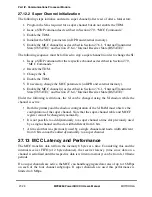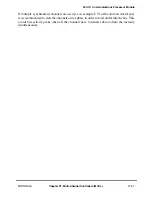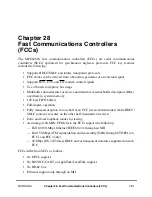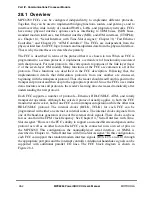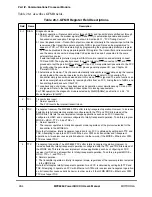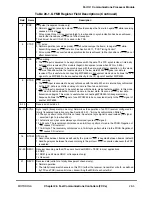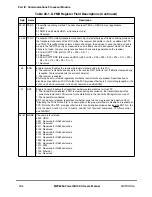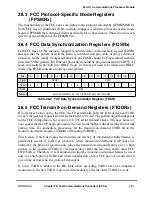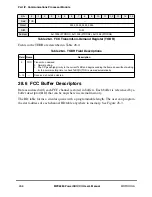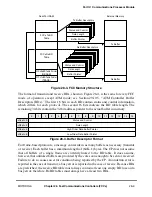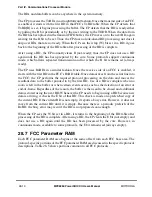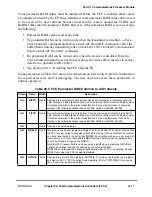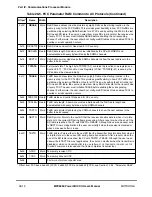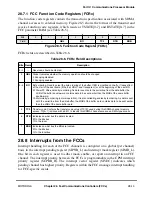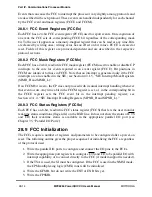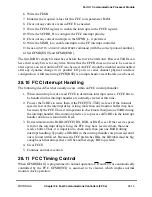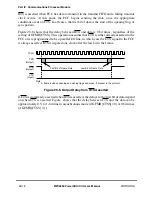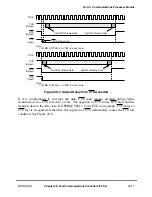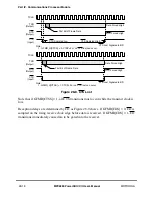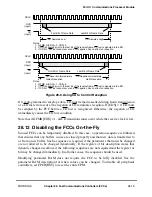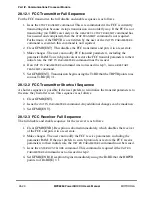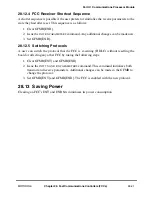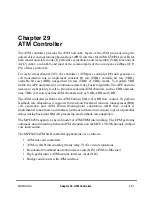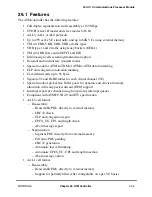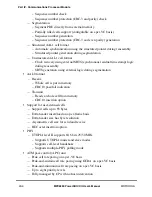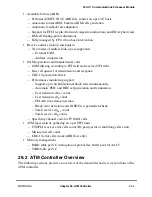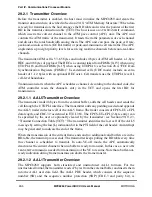
28-12
MPC8260 PowerQUICC II UserÕs Manual
MOTOROLA
Part IV. Communications Processor Module
0x0C
RBASE
Word
RxBD base address (must be divisible by eight). DeÞnes the starting location in the
memory map for the FCC RxBDs. This provides great ßexibility in how FCC RxBDs are
partitioned. By selecting RBASE entries for all FCCs and by setting the W bit in the last
BD in each BD table, the user can select how many BDs to allocate for the receive side
of every FCC. The user must initialize RBASE before enabling the corresponding
channel. Furthermore, the user should not conÞgure BD tables of two enabled FCCs to
overlap or erratic operation occurs.
0x10
RBDSTAT Hword RxBD status and control. Reserved for CP use only.
0x12
RBDLEN
Hword RxBD data length. A down-count value initialized by the CP with MRBLR and
decremented with every byte written by the SDMA channels.
0x14
RDPTR
Word
RxBD data pointer. Updated by the SDMA channels to show the next address in the
buffer to be accessed.
0x18
TSTATE
Word
Tx internal state. The high byte, TSTATE[0Ð7], contains the function code register; see
Section 28.7.1, ÒFCC Function Code Registers (FCRx).Ó TSTATE[8Ð31] is used by the
CP and must be cleared initially.
0x1C
TBASE
Word
TxBD base address (must be divisible by eight). DeÞnes the starting location in the
memory map for the FCC TxBDs. This provides great ßexibility in how FCC TxBDs are
partitioned. By selecting TBASE entries for all FCCs and by setting the W bit in the last
BD in each BD table, the user can select how many BDs to allocate for the transmit side
of every FCC. The user must initialize TBASE before enabling the corresponding
channel. Furthermore, the user should not conÞgure BD tables of two enabled FCCs to
overlap or erratic operation occurs.
0x20
TBDSTAT Hword TxBD status and control. Reserved for CP use only.
0x22
TBDLEN
Hword TxBD data length. A down-count value initialized with the TxBD data length and
decremented with every byte read by the SDMA channels.
0x24
TDPTR
Word
TxBD data pointer. Updated by the SDMA channels to show the next address in the
buffer to be accessed.
0x28
RBPTR
Word
RxBD pointer. Points to the next BD that the receiver transfers data to when it is in idle
state or to the current BD during frame processing. After a reset or when the end of the
BD table is reached, the CP sets RBPTR = RBASE. Although the user need never write
to RBPTR in most applications, the user can modify it when the receiver is disabled or
when no receive buffer is in use.
0x2C
TBPTR
Word
TxBD pointer. Points either to the next BD that the transmitter transfers data from when it
is in idle state or to the current BD during frame transmission. After a reset or when the
end of the BD table is reached, the CP sets TBPTR = TBASE. Although the user need
never write to TBPTR in most applications, the user can modify it when the transmitter is
disabled or when no transmit buffer is in use (after a
STOP
TRANSMIT
or
GRACEFUL
STOP
TRANSMIT
command is issued and the frame completes transmission).
0x30
RCRC
Word
Temporary receive CRC
0x34
TCRC
Word
Temporary transmit CRC
0x38
First word of protocol-speciÞc area
1
Offset from FCC base: 0x8400 (FCC1), 0x8500 (FCC2) and 0x8600 (FCC3); see Section 13.5.2, ÒParameter RAM.Ó
Table 28-5. FCC Parameter RAM Common to All Protocols (Continued)
Offset
1
Name
Width
Description
Summary of Contents for MPC8260 PowerQUICC II
Page 1: ...MPC8260UM D 4 1999 Rev 0 MPC8260 PowerQUICC II UserÕs Manual ª ª ...
Page 66: ...lxvi MPC8260 PowerQUICC II UserÕs Manual MOTOROLA ...
Page 88: ...1 18 MPC8260 PowerQUICC II UserÕs Manual MOTOROLA Part I Overview ...
Page 120: ...2 32 MPC8260 PowerQUICC II UserÕs Manual MOTOROLA Part I Overview ...
Page 138: ...Part II iv MPC8260 PowerQUICC II UserÕs Manual MOTOROLA Part II Configuration and Reset ...
Page 184: ...4 46 MPC8260 PowerQUICC II UserÕs Manual MOTOROLA Part II ConÞguration and Reset ...
Page 202: ...Part III vi MPC8260 PowerQUICC II UserÕs Manual MOTOROLA Part III The Hardware Interface ...
Page 266: ...8 34 MPC8260 PowerQUICC II UserÕs Manual MOTOROLA Part III The Hardware Interface ...
Page 382: ...10 106 MPC8260 PowerQUICC II UserÕs Manual MOTOROLA Part III The Hardware Interface ...
Page 392: ...11 10 MPC8260 PowerQUICC II UserÕs Manual MOTOROLA Part III The Hardware Interface ...
Page 430: ...Part IV viii MOTOROLA Part IV Communications Processor Module ...
Page 490: ...14 36 MPC8260 PowerQUICC II UserÕs Manual MOTOROLA Part IV Communications Processor Module ...
Page 524: ...17 10 MPC8260 PowerQUICC II UserÕs Manual MOTOROLA Part IV Communications Processor Module ...
Page 556: ...18 32 MPC8260 PowerQUICC II UserÕs Manual MOTOROLA Part IV Communications Processor Module ...
Page 584: ...19 28 MPC8260 PowerQUICC II UserÕs Manual MOTOROLA Part IV Communications Processor Module ...
Page 632: ...21 24 MPC8260 PowerQUICC II UserÕs Manual MOTOROLA Part IV Communications Processor Module ...
Page 652: ...22 20 MPC8260 PowerQUICC II UserÕs Manual MOTOROLA Part IV Communications Processor Module ...
Page 668: ...23 16 MPC8260 PowerQUICC II UserÕs Manual MOTOROLA Part IV Communications Processor Module ...
Page 758: ...27 28 MPC8260 PowerQUICC II UserÕs Manual MOTOROLA Part IV Communications Processor Module ...
Page 780: ...28 22 MPC8260 PowerQUICC II UserÕs Manual MOTOROLA Part IV Communications Processor Module ...
Page 874: ...29 94 MPC8260 PowerQUICC II UserÕs Manual MOTOROLA Part IV Communications Processor Module ...
Page 920: ...31 18 MPC8260 PowerQUICC II UserÕs Manual MOTOROLA Part IV Communications Processor Module ...
Page 980: ...A 4 MPC8260 PowerQUICC II UserÕs Manual MOTOROLA Appendixes ...
Page 1002: ...Index 22 MPC8260 PowerQUICC II UserÕs Manual MOTOROLA INDEX ...
Page 1006: ......

